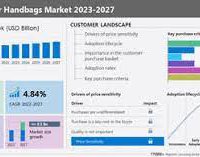According to Technavio, the global leather handbags market size is estimated to grow by USD 8.5 billion from 2022 to 2027. The market is estimated to grow at a CAGR of 4.84%. Moreover, the growth momentum will accelerate. APAC (North America, Europe, South America, and Middle East and Africa) will account for 32% of the market's growth during the forecast period.
The report provides a comprehensive analysis of growth opportunities at regional levels, new product launches, the latest trends, and the post-pandemic recovery of the global market.
Technavio has segmented the market based on distribution channel (offline and online), type (shoulder bags, satchel bags, tote bags, and sling bags).
The offline segment will account for a significant share of the market's growth during the forecast period. This channel generates revenue from the sales of products through specialty stores, including exclusive brand stores, multi-brand stores, apparel stores, factory outlets, airport retail stores, and personal goods stores; hypermarkets, supermarkets, convenience stores, and clubhouse stores; and department stores. Department stores and specialty stores are the largest revenue contributors through offline channels. Brands are expanding their presence globally by establishing new stores in prominent markets such as North America and Europe. Such strategies are expected to drive sales growth through offline stores during the forecast period.
Based on geography, the global leather handbags market is segmented into APAC, North America, Europe, South America, and Middle East and Africa. The report provides actionable insights and estimates the contribution of all regions to the growth of the global leather handbags market.
APAC is estimated to account for 32% of the growth of the global market during the forecast period. China, South Korea, Japan, and India are the key countries in this region. The growth of the market is attributed to factors such as the rise in awareness and the increase in demand for fashion products. The increasing target population (15-64 years) and the rising disposable income will also drive the demand for leather handbags, including premium and luxury handbags.
Key factor driving market growth
- The influence of celebrity endorsements on customer purchase decisions is driving market growth.
- Celebrity endorsement is a popular marketing tool used by vendors, which helps build their brand image and increase product awareness.
- Vendors sign multi-year endorsement agreements with well-known celebrities to enhance their brand value.
- For instance, Selena Gomez and Michael B. Jordan are brand ambassadors for Coach, a brand by Tapestry Inc.
- Customer engagement programs through offline and online channels help increase awareness.
- Vendors can promote their products at a minimal cost with the growing internet penetration and the success of social media campaigns.
- These factors will fuel the growth of the market during the forecast.
Trends
- The introduction of different leather varieties is a key trend in the market.
- The demand for leather tanned from exotic animals has increased during the last few years.
- These handbags are considered expensive, and most of their demand comes from high-profile vendors.
- These factors will propel the value sales of leather handbags, which, in turn, will support the market growth during the forecast period.
Major challenges hindering the market growth
- Rising labor costs and fluctuating raw material prices are challenging the leather handbags market growth.
- Leather manufacturing includes several steps, such as procurement, processing, and tanning or synthesizing.
- However, various governments have imposed regulations on manufacturing, which increases the price of leather.
- Labor costs in countries such as China, Indonesia, Bangladesh, and Vietnam, where manufacturing facilities of various international brands are located, have grown rapidly over the last decade.
- This increases the production of vendors, thereby lowering their profit margins.
- These factors will impede the market growth during the forecast period.
Related Reports:
The leather goods market is estimated to grow at a CAGR of 6.24% between 2022 and 2027. The size of the market is forecasted to increase by USD 90.98 billion. This report extensively covers market segmentation by product (footwear, LBWP, and others), distribution channel (offline and online), and geography (APAC, North America, Europe, South America, and Middle East and Africa).
The leather and allied products market size is expected to increase by USD 138.82 billion from 2021 to 2026, and the market's growth momentum will accelerate at a CAGR of 5.59%. This report extensively covers segmentation by product (footwear, luggage, bags, wallets, and purses, and others) and geography (APAC, North America, Europe, South America, and Middle East and Africa).
Abstract
|
Leather Handbags Market Scope |
|
|
Forecast period |
2023-2027 |
|
Growth momentum & CAGR |
Accelerate at a CAGR of 4.84% |
|
Market growth 2023-2027 |
USD 8.5 billion |
|
Market structure |
Fragmented |
|
YoY growth 2022-2023 (%) |
4.62 |
|
Regional analysis |
APAC, North America, Europe, South America, and Middle East and Africa |
|
Performing market contribution |
APAC at 32% |
|
Key countries |
US, China, Germany, UK, and France |
|
Competitive landscape |
Leading vendors, market positioning of vendors, competitive strategies, and industry risks |
|
Key companies profiled |
Alexander McQueen Trading Ltd., Burberry Group Plc, Capri Holdings Ltd., Cole Haan International B.V., CraftShades, Dooney and Bourke Inc., Fossil Group Inc., Guess Inc, Hennes and Mauritz AB, Hermes International SA, Hidesign, Kering SA, Lefty Production Co., LVMH Moet Hennessy Louis Vuitton SE, Prada Spa, Stefano Ricci S.p.A., Steven Madden Ltd, Tapestry Inc., Ted Baker PLC, and River Light V L.P. |

